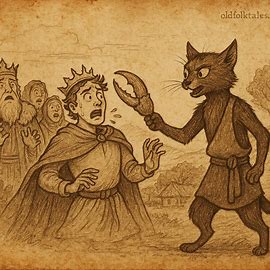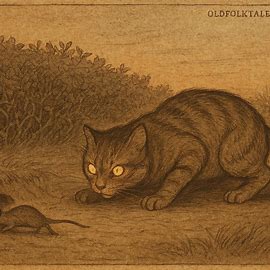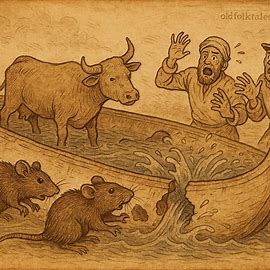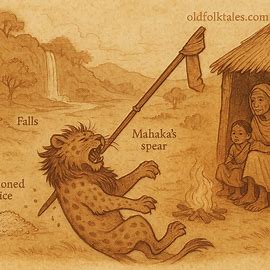In the highlands of Madagascar, where the Merina people built their kingdoms of stone and earth, lived two infamous companions known throughout the land: Kotofetsy and Mahaka. Their names carried whispers of cunning, mischief, and endless schemes. No one could match their craftiness, and yet their tricks continued to astonish, for their minds were quick as fire and deep as the sea. One day, they set their eyes on their boldest victim yet, the king himself.
The Prince on the Hill
It was known that the king’s son, a lively young prince, amused himself by making crickets fight. Every afternoon he climbed a certain hill, surrounded by servants and curious villagers, to watch the insects battle. His laughter carried across the fields, and his shouts stirred excitement among those who followed him.
Kotofetsy and Mahaka, always hunting for opportunity, hatched a plan. “The boy loves games,” Kotofetsy whispered, “and where games dwell, folly is never far behind. Today, we will make a prince cry and a king pay dearly for it.”
The Trap in the Earth
At dawn, Kotofetsy took a hoe and dug a hole at the top of the hill, deep enough for Mahaka to climb inside. He covered the pit with earth and grass, leaving only a small opening no wider than a hand. Into Mahaka’s hand, he placed a large crab, its claws snapping angrily.
“Remember,” Kotofetsy instructed, “when the prince grabs, you pinch. Do not let go until my signal.” Mahaka grinned and slid into the hole, vanishing beneath the earth. Soon, only the crab’s claw poked out, glinting in the sunlight.
The Prince Falls Into the Trap
When the prince arrived with his entourage, his eyes quickly caught the curious claw sticking out of the ground. “What strange creature is this?” he exclaimed, kneeling to seize it.
The moment his fingers closed around the claw, Mahaka’s hand shot out and clamped onto him with iron strength. The crab pinched viciously, and Mahaka’s grip crushed like stone. The prince screamed in agony.
“Help! I am dying!” he cried, his voice trembling with fear. He tugged, but the unseen hand held him fast. The crowd gasped, confusion spreading like fire through dry grass.
The Tricksters’ Deception
Kotofetsy rushed forward, his face painted with false alarm. “Do you not see?” he shouted. “This is no crab. It is a vazimba spirit dwelling in the earth! It has taken hold of the prince, and it will not release him unless it is paid.”
The people murmured in terror. Among the Merina, the vazimba, ancient spirits of the land, Mwere feared and respected. None would dare anger them.
The prince sobbed, his hand still trapped, his face pale. “Please, do something! Free me!”
Kotofetsy turned solemnly to the crowd. “The vazimba will only let go for a great payment. Ten piastres at least, to calm its anger.”
The prince quickly offered ten, but Mahaka pinched harder. The boy shrieked louder than before. Kotofetsy shook his head gravely. “Too little. The vazimba refuses.”
The king himself, shaken by his son’s cries, stepped forward. He offered fifty piastres. Kotofetsy took the coins and placed them on the prince’s trapped hand. Then he declared, “Vazimba spirit, if you are satisfied, loosen your grip. If not, hold him fast.”
Mahaka eased his hold slightly but still did not release. The prince whimpered, tears staining his cheeks.
“The vazimba is insulted,” Kotofetsy announced. “It rejected ten, and it rejects fifty. Nothing less than one hundred piastres will satisfy it!”
Desperate, the king gave the full sum. Kotofetsy placed the money upon the prince’s hand once more. At that signal, Mahaka released him entirely. The prince snatched back his hand, trembling, his arm marked with red welts.
The Escape and the Laughter
“Beware!” Kotofetsy cried, raising his hands. “The vazimba is restless. Leave this place quickly, lest it punish anyone else!”
The king gathered his son and hurried away with the crowd, none daring to linger. Only when the hill was empty did Mahaka crawl out of the hole, laughing until his sides ached. Kotofetsy joined him, the heavy bag of coins clinking in his hand.
Together they reveled in their victory. “We tricked not a farmer nor a fool today,” Mahaka crowed, “but the king himself!”
News spread swiftly across the highlands. People marveled that the tricksters had deceived royalty, and though some cursed their names, others could not help but admire their cunning.
Moral Lesson
This tale warns against the dangers of greed and gullibility. The king, blinded by fear for his son, gave away more and more until he lost a great sum. The prince, reckless in his curiosity, fell easily into the trap. Both were outwitted because they placed trust where caution was needed.
The story also highlights how cunning can overpower even the powerful. Kotofetsy and Mahaka thrived not through strength or wealth, but through wit. Yet their victory serves as a warning: deception brings laughter to the deceivers, but leaves wounds of shame for the deceived.
Knowledge Check
1. Who were Kotofetsy and Mahaka?
They were legendary tricksters of the Merina people in Madagascar.
2. What pastime did the prince enjoy on the hill?
He amused himself by making crickets fight.
3. How did Mahaka trap the prince’s hand?
By hiding in a hole with a crab and grabbing the prince’s hand when he reached for the claw.
4. What did Kotofetsy claim the trap to be?
The work of a vazimba spirit demanding payment.
5. How much money finally freed the prince?
One hundred piastres.
6. What lesson does the tale teach?
That greed, fear, and gullibility make even the powerful vulnerable to cunning deception.
Source: Merina folktale, Madagascar.






